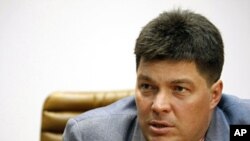An envoy of Russian President Dmitry Medvedev meets Tuesday in Benghazi with leaders of Libya’s opposition.
But the envoy, Mikhail Margelov, is not expected to travel onward to the Libyan capital, Tripoli. In fact, foreign policy analysts in Moscow are not predicting much success for the Russian mediation effort in Libya’s civil war.
Fyodor Lyukanov, editor of Russia in Global Affairs, says, “Russia does not have so much to offer Libya. Gadhafi is not an exclusive partner of Russia. Russia has not much leverage on him, and I would even guess that Colonel Gadhafi maybe would prefer not Russian, but African mediation.”
Lyukanov says that Libya’s leader, Moammar Gadhafi, now sees Russia as taking the side of NATO in the conflict. After abstaining in the United Nations vote in March authorizing NATO to enforce a no-fly zone, Russia basically sat on the fence during the first two months of NATO’s military action.
Then, 10 days ago, at the recent Group of Eight summit in France, President Medvedev had a long talk with U.S. President Barack Obama about Libya. Emerging from the meeting, the Russian president said he had agreed to try to mediate, but he also told reporters, “Gadhafi’s regime has lost its legitimacy - he has to go.”
After that comment, Libyan officials in Tripoli started to say that Russia was now aligning itself with Western powers in their attempt to unseat Mr. Gadhafi. As a result, the Russian envoy has not won permission to travel to Tripoli.
Finding new home for Gadhafi
Margelov has said his job is to find a new home for the Libyan leader, mentioning Qatar and Saudi Arabia as countries that might offer asylum. The Russian envoy has said that Western officials have talked about different possibilities for the Libyan leader - “from a quiet life as a simple Bedouin in the Libyan desert” to becoming a defendant at the International Court of Justice in The Hague.
Evgeniy Satanovsky, president of Moscow’s Near Eastern Study Institute, predicted that Mr. Gadhafi will cling to power as long as possible. He compared the Libyan leader to dictators like Iraq’s Saddam Hussein or Yemeni President Ali Abdullah Saleh, who fled his country Sunday after being wounded by a rebel attack on his palace.
“People like Saddam Hussein, or President Saleh, he want power to the last second," said Satanovsky. "He want to be on the top as the leader of his country. But Russia has a chance.”
Russia: Striving for neutrality
While Libyan officials say that Russia now sides with NATO, Russian officials have strived to stay neutral. Russian officials worried openly about the fate of $4 billion in arms contracts with the Gadhafi government.
Early in the campaign, Russian Prime Minister Vladimir Putin compared the European attack on Tripoli to “a medieval call to the Crusades.”
On Sunday, Russian Foreign Minister Sergei Lavrov warned that NATO attacks were “either consciously or unconsciously sliding towards a land operation."
The comments were triggered by NATO’s first use on Saturday of attack helicopters inside Libya. Previously, NATO relied on attack jets generally flying above 4,500 meters.
In reaction, Russian Deputy Prime Minister Sergei Ivanov said Sunday that NATO is moving beyond its mandate to control Libya’s airspace. He said, “We think it clearly takes one side of the conflict."
Russia split over Libya?
Russia’s seeming split over Libya reflects a wider, conservative approach to the street revolutions generally known as "the Arab Spring."
Satanovsky says the “so-called Arab Spring is not a spring. It opened the gates to power for radical islamists.”
Russia’s caution toward revolution comes from having experienced two major revolutions in the 20th century - the communist uprising in 1917 and the collapse of the Soviet Union in 1991.
“Experience how quickly euphoria about revolution disappears and will be replaced by completely different reality," said Yukanov. "This is the Russian experience.”
With this deep skepticism of revolution prevailing in Moscow, some analysts there see President Medvedev’s move to break with Mr. Gadhafi as a victory for President Obama’s policy of engaging Russia - a policy known as the "reset."




